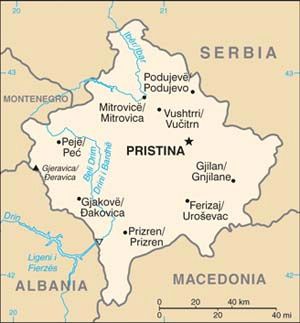Kosovo: NATO’s Actions Illegal, Illogical And Immoral – Analysis
Through its illegal, illogical and immoral actions, NATO is reducing the Serbs’ room for cooperation and peaceful rejection of Kosovo institutions, and setting the stage for more violence and perhaps full partition.
By Gerard Gallucci
NATO’s Kosovo force (KFOR) spent yesterday seeking to further cut-off the northern Kosovo Serbs from Serbia. Since July, KFOR – using mostly American National Guard troops and German soldiers – have been supporting the Kosovo government’s effort to force Kosovo Serbs and Serbia to accept the imposition of its customs checkpoints, despite the continued rejection of Kosovo independence by Serbia.

On September 27, NATO used force – tear gas and bulldozers – to remove a barricade placed by the local Serbs in Jerinje (Gate 1), while then using more force – this time rubber bullets and live fire – to chase away protesting Serbs trying to prevent KFOR’s effort to close an alternative route that locals were using to cross the boundary.
NATO (and the EU) then shamelessly blamed the Serbs and sought to prevent evidence of its actions from coming to light. On the 29th, NATO continued its effort to isolate the northern Serbs and force them to submit to Kosovo customs by destroying the alternate gravel road and placing a checkpoint there. Some reports suggest that KFOR crossed the administrative line to make the road inoperable from the Serbian side as well.
NATO’s activities have strayed far from the UNSCR 1244 mandate by which it is in Kosovo. By 1244, NATO’s duties in Kosovo include “ensuring public safety and order until the international civil presence can take responsibility,” “conducting border monitoring duties as required,” and “ensuring the protection and freedom of movement of itself, the international civil presence, and other international organizations.”
It would be legal for KFOR to monitor the boundary – even place check points to conduct weapons searches – and to ensure it, EULEX and UNMIK can exercise freedom of movement. But its responsibility to “ensure public safety” means it should conduct its activities in a manner that does not in itself threaten the peace. Under 1244, NATO has no political role whatsoever. It is not KFOR’s business to be channelling traffic across the boundary into Kosovo customs checkpoints. This is playing a political role and has proven a threat to public safety. NATO is acting illegally.
The northern Serbs have been careful to allow ways for KFOR and EULEX to cross their barricades, and have reacted only when it appeared the internationals were using this access to assist Pristina’s police and customs officials in reaching the crossing points. The barricades are there to prevent another unilateral provocation such as occurred on July 26, when Pristina sent its special police to seize the boundary.
KFOR’s new commander continues to suggest that he understands issues such as the barricades and courts should be settled through means other than military. But he also is repeating the line used by his predecessor that it is criminals and smugglers who make barricades and use alternate roads. This ignores the many reasons that normal people would have to cross the boundary without submitting to KFOR/EULEX blackmail to use the Kosovo customs points.
The commander may have been overruled by the US and German governments, or perhaps the commanders in the field have simply been operating on orders from their embassies. In any case, the Serbs can find ways around the NATO blockade and they are unlikely to submit to efforts to force them to accept Kosovo customs. Not even Belgrade can change that, as it appears to come to grips with its inability to bend as far as the EU and US demand. NATO is thus reducing the Serbs’ room for cooperation and peaceful rejection of Kosovo institutions and setting the stage for more violence and perhaps full partition. Its behavior is illogical.
Finally, NATO is showing the world that when the Big Western Powers feel like it, they can just disregard the terms set by the UN Security Council. They did the same in Libya. Some may agree with what NATO has done/is doing in Libya or Kosovo. But the Alliance’s readiness to cast aside UN mandates may make it harder to convince others to grant new ones in the future. The precedent set by NATO’s illegal and illogical actions in north Kosovo undercuts UN peacekeeping and handicaps the international community’s ability to maintain world peace. Flaunting international law and the means by which we collectively determine our cooperation is dangerous and deeply immoral.
Gerard M. Gallucci is a retired US diplomat and UN peacekeeper. He worked as part of US efforts to resolve the conflicts in Angola, South Africa and Sudan and as Director for Inter-American Affairs at the National Security Council. He served as UN Regional Representative in Mitrovica, Kosovo from July 2005 until October 2008 and as Chief of Staff for the UN mission in East Timor from November 2008 until June 2010. Gerard is also a member of TransConflict’s Advisory Board. The views expressed in this piece are his own and do not represent the position of any organization.
